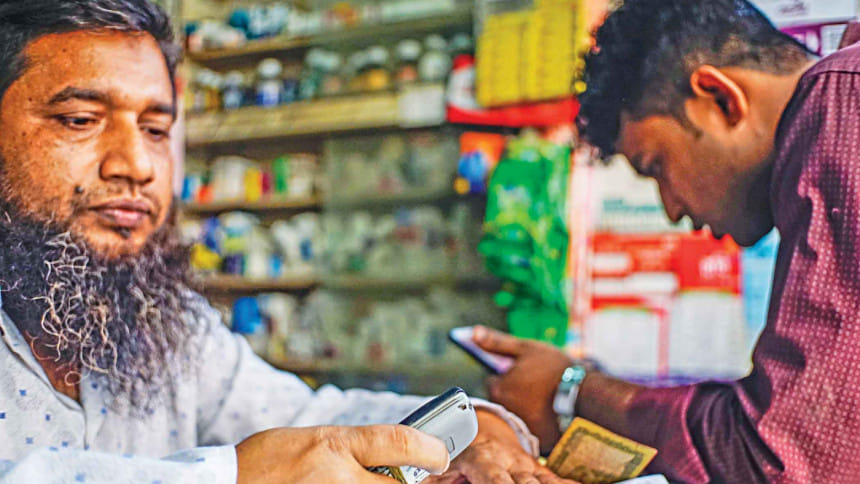Revisit corporate tax hike for MFS

Bridges over the mighty rivers have seamlessly connected Bangladesh, the naturally fragmented largest delta in the world. It has prompted the rapid buildout of highways and roads networks to accelerate the nationwide movement of passengers and goods.
Incentivised education has lifted the rate of literacy while universal immunisation deters maternal and infant mortality. The invention of high-yield varieties of rice has exiled famine. Nationwide electrification has lightened up rural homes and businesses.
The mobile phone has injected magical pace and spread to personal and business communications. And mobile financial service (MFS) has added unprecedented ubiquity, frequency and security to interpersonal and small business transactions.
All combined writes the country's secret recipe of impressive economic growth.
It could be glitterier had Bangladesh applied predictable regulation to boost the confidence of investors. Policymakers should mind these economic growth engines' regulatory fragility. The principle of taxing the juvenile MFS, as proposed in the current budget, should be revisited.
Mobile technology has democratised telephony, which was a novelty. Launched in 1997, the mobile phone has primarily salvaged the urban middle-class and then rescued rural lives from state-owned telecom companies' monopoly. Money does not move, information does. Therefore, each mobile phone became unintended tellers by the bank-led MFS outfits in 2011.
Since then, it has been the vast number of mostly rural unbanked citizens' preferred fund transfer instrument. With the "scary" procedures of opening an account, banks can't match the ubiquitous, secure, and after-hours operations of MFS outlets in terms of cash transactions.
Currently, more than 60 per cent of the cash-out disbursements happen in the villages. No wonder the government uses MFS as the preferred vehicle to deliver its social safety net payments and educational scholarships.
Such uniquely effective small step of MFS for gigantic financial inclusion in the cash-driven economy of Bangladesh needs prudent regulation.
As opposed to the reduction of 2.5 percentage points for all other companies, this year's budget proposes the corporate tax hike on MFS from 32.5 per cent up to 40 per cent. It is like plugging a bomb with the altimeter which explodes once the aircraft ascends to cruising altitude.
Since no MFS outfit makes a profit, the corporate tax does not apply to them either. They collect 10 per cent advance income tax (AIT) from their agents and 12 per cent AIT from the distributors on behalf of the government. In addition, there is a 15 per cent value-added tax on the cash-out fees.
According to bKash, the dominant MFS, Tk 638 crore was paid as taxes while it incurred a loss of Tk 81 crore during the 2019-20 fiscal year. Yet bKash and its 14 other rivals keep investing in their long pursuit for profit. But the taxmen want to count the chickens before they hatch.
It sends a chilling signal to existing and potential investors of the technology-centric nascent MFS industry. Continuous investment in technology to run secured digital payment operations consumes the yield of rising MFS. It seems incomprehensible among the policymakers.
Tax authorities have wrongly bracketed the MFS industry with the scheduled banks. Banks make money from decades-old, if not centuries, mammoth lending products. The MFS companies are, however, mostly cash movers using mobile phone technology.
Unlike banks, the MFS outfits deal with negligible numbers of very old-fashioned retail banking products with minimal yield. Some of them, like remittance handling, are strictly asymmetric as it only delivers converted inward cash. Fundamentally, structural difference and huge operational disparity between banks and MFS should be the guiding principle of taxation.
Authorities should appreciate the fact that MFS outfits, not the traditional banks, have effectively succeeded in bringing the mass population of Bangladesh to the formal channel of payments.
The journey is, however, far from over, as only 20 per cent, or 37 million, of the population, actively operate MFS accounts, according to the central bank. The growth potential of the MFS market, with 15 providers, lies with 174 million mobile phone users.
Therefore, the MFS market should be allowed to grow, while premature and counterproductive 40 per cent corporate tax waits for everybody's interest.
The author is a senior policy fellow at LIRNEasia

 For all latest news, follow The Daily Star's Google News channel.
For all latest news, follow The Daily Star's Google News channel. 



Comments